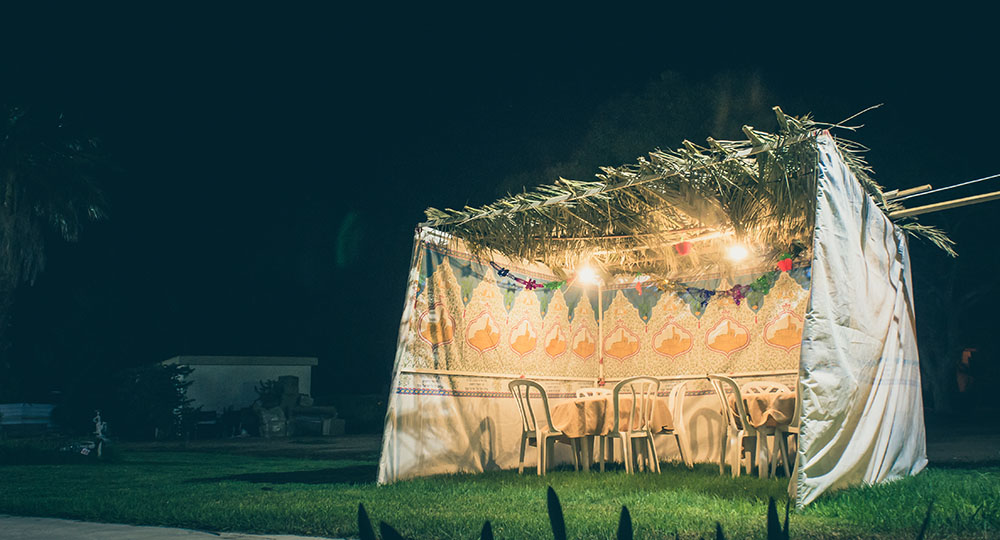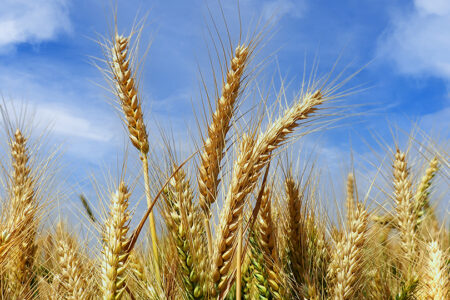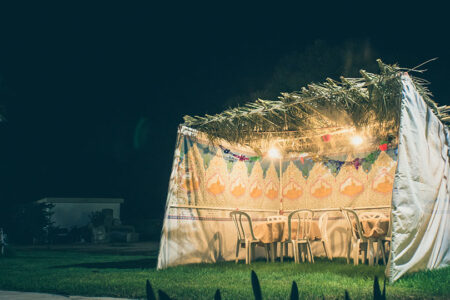Holiday Under the Stars
God commanded His people to dwell in booths for seven days each year—and they still follow this tradition today at Sukkot.
Many years ago, a pastor and I visited a friend who is a rabbi at a local synagogue. Sukkot was approaching, and Rabbi offered to take us into the synagogue sukkah and explain how Jewish people celebrate this important holiday the Bible calls the Feast of Tabernacles.
He showed us how to hold the etrog and the proper way to shake the etrog and lulav and told us some people even like to sleep in their sukkot (plural of sukkah). In Israel, these temporary booths adorn balconies and backyards throughout the land; and they’re often decorated with greenery, strings of lights, and a table and chairs so people can dine there under the stars.
It makes sense to sleep in them because the Feast of Tabernacles celebrates the fall harvest and reminds the Jewish people how God sustained them while they dwelt in tents in the wilderness for 40 years, en route to the Promised Land.
The Biblical Observance
Sukkot is the last of the seven celebrations God gave His people: “Then the LORD spoke to Moses, saying ‘Speak to the children of Israel, saying, “The fifteenth day of this seventh month shall be the Feast of Tabernacles for seven days to the LORD”’” (Lev. 23:33–34).
It begins on the 15th day of Tishrei (September/October) on the Jewish calendar and is one of the three pilgrimage feasts that required all Jewish men to appear before the Lord at the Temple in Jerusalem (Dt. 16:16). The others were Passover and Shavuot (also called the Feast of Weeks and Pentecost).
Sukkot, like Israel itself, originally was agricultural in nature. People celebrated and gave thanks for the bounty of their crops three times during the year.
→ Before the harvest: Firstfruits involved praising and thanking the Lord for a harvest they had not yet received.
→ During the harvest: Shavuot marked the wheat harvest (Ex. 34:22). Today many Jewish congregations read the book of Ruth because it takes place at harvest season.
→ After the harvest: Tabernacles celebrated God’s provision of food for the coming winter.
God commanded Israel, “For seven days you shall offer an offering made by fire to the LORD. On the eighth day you shall have a holy convocation, and you shall offer an offering made by fire to the LORD. It is a sacred assembly, and you shall do no customary work on it” (Lev. 23:36).
Along with bringing sacrifices, God’s people were to “dwell in booths for seven days. All who are native Israelites shall dwell in booths, that your generations may know that I made the children of Israel dwell in booths when I brought them out of the land of Egypt: I am the LORD your God” (vv. 42–43).
Booths, Lulav, and Etrog
Today Jewish people around the world build sukkot on their property and at their synagogues.
Every sukkah must be a temporary structure. Roofs often are made of bamboo poles and covered with beautiful evergreen branches arranged in a way that allows the stars and evening sky to shine through. While many Orthodox Jews often eat and sleep in their sukkot, most families eat one or two meals a day there.
The modern observance also involves an etrog, or citron, which looks like a large lemon, and branches of certain trees, bound together into what is called a lulav. This tradition comes from Leviticus 23:40: “And you shall take for yourselves on the first day the fruit of beautiful trees, branches of palm trees, the boughs of leafy trees, and willows of the brook; and you shall rejoice before the LORD your God for seven days.”
The branches come from palm, myrtle, and willow trees. The branches and etrog are called the “four species.” On each day of Sukkot, people stand facing east toward Jerusalem, holding in front of them a lulav in the right hand and an etrog in the left; and they shake them in a specific way three times, saying a prayer. A rabbi explained, “We take the Four Species to supplicate God for rain—that God’s goodness descend from the Heavens to grant us physical blessings as well.”1
My rabbi friend said they wave the lulav and etrog in all four directions to signify that God is everywhere.
Prophetic Application
Tabernacles also has an important prophetic application. Both the Old and New Testaments teach that a time of unprecedented horror will come upon the Jewish people. It will be “the time of Jacob’s trouble” (Jer. 30:7), also known as the seven-year Tribulation.
Satan will indwell the evilest ruler to ever live: the Antichrist. Through trickery and deceit, the Antichrist will goad God’s people into trusting and following him. At the midpoint of the seven years, he will try to force the Jewish people to worship him. They will refuse, and he will break a covenant he made with them and ruthlessly seek their annihilation:
Then he [Satan through the Antichrist] shall confirm a covenant with many [Israel] for one week [seven years, the Tribulation period]; but in the middle of the week [at 3 1/2 years] he [Satan/Antichrist] shall bring an end to sacrifice and offering. And on the wing of abominations shall be one who makes desolate (Dan. 9:27).
At the end of this horrific time that will afflict the entire world, Jesus, Israel’s true Messiah, will return to deliver His people and establish a Kingdom of righteousness. He will reign over Israel and the world from the throne of His father David—tabernacling among His beloved people.
The prophet Zechariah spoke of this wonderful era, saying everyone in the Millennial Kingdom will be required to “go up from year to year to worship the King, the LORD of hosts, and to keep the Feast of Tabernacles” (Zech. 14:16).
Prophetically, this holiday looks forward to the reality that someday God will dwell on Earth with His people, and He will be with them forever. Maranatha, our Lord come.
ENDNOTE
-
-
- “Ask the Rabbi: Why Do We Shake the Lulav?” aish.com (tinyurl.com/lulavvv).
-









One Jewish writer described this feast as the most joyous of the seven. The feast sound like a wedding feast to me. I see Sukkot as the marriage feast of the lamb. Our bodies are described as a tabernacle. They are temporary and we await our entrance to the Promised Land.
Dear Tom Simcox
This e-mail letter and message and correspondence is regarding and concerning that I would like to take this opportunity and this privilege in sharing with you that I have just finished reading through your article and through your study Holidays Under the Stars.
I have founded it very deeply and extremely and very keenly interested. I have a deep love and burden to minister and to reach out with the Full and with the True Gospel Message and the Good News of our Blessed and Gracious Lord and Saviour Jesus Christ to the Jewish People and to the Lost Sheep of the House of Israel through my financial giving and prayer support and through my involvement with Jewish Missions and with Jewish Evangelism and Ministry and Outreach at The Friends of Israel Gospel Ministry Inc.
I try faithfully to make the effort in joining and watching and listening to the Bible Conferences in regards to Israel and also in regards to Bible Prophecy and to Biblical Eschatology and End-Time Events that will usher in the return and the second-coming of our Blessed and Gracious Lord and Saviour Jesus Christ.
I am a student in studying and in reading books and the Holy Bible and the Israel My Glory Magazine and the O Timothy Newsletter and Magazine in relation to Bible Prophecy and in End-Time Events that are signs that prophecy is being fulfilled, even though the Rapture of the Church can happen any moment.
My deepest and sincere prayer and intercession for the Nation of Israel is that they will be saved and accept the Lord Jesus Christ as their Jewish Messiah and their own personal Lord and Saviour.
I have adopted a missionary in The Friends of Israel Gospel Ministry Inc. whose is Brother Cameron Joyner. I very deeply support his ministry and his outreach of the Gospel Message in The Friends of Israel Gospel Ministry Inc. both financially and by prayer support. I also contact him by e-mail letter and message and correspondence to encourage him and to uplift him through my e-mail correspondence.
If you wish to or if you like to or want to e-mail me and send me an e-mail reply and an e-mail response to this e-mail letter and message and correspondence, than you are more than welcome. My home e-mail address is costis1956@gmail.com. Thank you so very, very much and may God richly bless you and your family and your loved ones as well as your ministry and your outreach and your service of the Full and of the True Gospel Message of Salvation to the Jewish People worldwide and globally and to the Lost Sheep of the House of Israel at The Friends of Israel Gospel Ministry Inc.
From your dearest and closest
Brother and Friend in Christ
Love in Christ’s
Name
Brother Costis Chryssopoulos